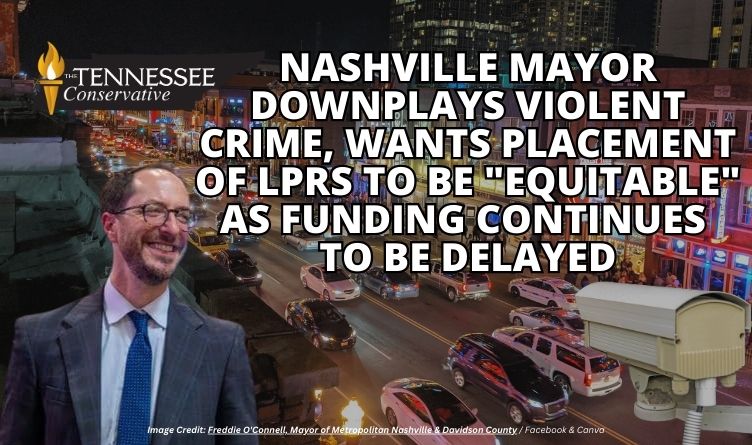Image Credit: Freddie O’Connell, Mayor of Metropolitan Nashville & Davidson County / Facebook & Canva
The Tennessee Conservative [By Paula Gomes] –
Despite Metro Police Chief John Drake reiterating the need for License Plate Readers (LPRs), Nashville Mayor Freddie O’Connell continues to delay funding while downplaying violent crime across the city.
O’Connell says that the policy regarding LPRs that Metro Council has deferred over and over again for more than two years still needs work citing “equitable” placing of cameras as one of the main points needing to be addressed.

Drake, along with District Attorney Glenn Funk, and the Metro Council have all called for the implementation of LPRs as violent crime continues to affect residents, and in some cases takes innocent lives.
In the recent case of Alyssa Lokits, Drake has said that LPRs would have helped Metro Nashville Police Department (MNPD) gain information more quickly in tracking down her assailant.
Lokits was jogging on a public greenway when she was attacked by would-be rapist Paul Park who allegedly shot her in the head when she fought back.
After the horrific murder of Lokits, O’Connell reassured Nashvillians that safety remained his top priority as mayor, including the use of technology to keep neighborhoods safe.
It would appear that LPRs are exactly what the city needs to meet that goal after a six-month pilot of the program yielded over a hundred felony arrests.
Dennis Ferrier from FOX 17 News confronted O’Connell about LPRs at a roundtable last week, calling them the “elephant in the room.”
O’Connell disagreed with Ferrier’s assessment that “Nashville streets run with blood…” saying that violent crime “remains down year over year.”
The list of concerns holding up final approval and funding of LPRs comes from multiple communities across the county according to O’Connell. His office forwarded these points of concern to FOX 17.
They included ensuring that established guardrails in regard to LPRs would have the force of law, that data used to initiate police intervention comes only from trustworthy sources, that constitutional rights of residents are protected and that recording devices are “placed equitably.”
Nearby Mt. Juliet in Wilson County implemented a LPR program in 2020 called Guardian Shield – currently 42 locations at intersections of main roads, Interstate 40 and county lines – which has been successful in recovering hundreds of stolen cars, the majority of which were associated with Nashville residents and stolen from Nashville.
Deputy Chief Tyler Chandler told The Tennessee Conservative yesterday that while Mt. Juliet Police Department (MJPD) has solved many crimes, and apprehended dangerous offenders with the help of LPRs, the majority of these suspects come from outside of Mt. Juliet.
While Nashvillians would obviously benefit from LPRs, Chandler says residents in Mt. Juliet and the broader area would also be helped by Metro adopting a similar system.
With most of Nashville’s bordering cities already operating their own programs, adding Nashville to the mix would give law enforcement access to an even broader pool of data with which to track down dangerous criminals who often travel between neighboring cities.
Chandler says this would lead to quicker identification and arrests across the entire region and reduce overall crime, making Nashville, Mt. Juliet and other nearby cities safer.
Due to no current LPR program in Nashville, Mt. Juliet and other cities shoulder a heavier burden as they end up apprehending suspects from Nashville more often over local suspects. Chandler says that Nashville setting up its own LPR system would reduce the load on Mt. Juliet law enforcement as suspects could potentially be apprehended before crossing over into Wilson County.
Nashville LPRs would also lead to more effective collaboration between cities, not only in faster and more coordinated responses in real time as crimes occur, but also in sharing data for investigating serious crimes.
“In short, if Nashville adopts LPRs, it will contribute to a stronger, more unified approach to public safety, with Mt. Juliet and surrounding communities benefiting from increased support in handling cross-city crime,” said the MJPD Deputy Chief.

Mt. Juliet’s Guardian Shield alerts when license plates of vehicles associated with a crime and on a hotlist – generated from the National Crime Information Center database – are captured. Wanted persons, missing persons, felony-involved vehicles, stolen plates and vehicles are entered into this database by law enforcement agencies.
The system is not used for anything related to traffic enforcement, but instead shields the community from vehicles on the hotlist or to investigate serious crimes which include criminal homicide, forcible rape, kidnapping, robbery, aggravated assault, burglary, motor vehicle theft, dangerous drug offenses or wanted persons.
While the technology records video and images of the vehicle, it does not know who is driving or may be in the car, and does not access any license plate database to access personal data or determine who owns the vehicle. Any video or images are discarded after 30 days.

About the Author: Paula Gomes is a Tennessee resident and reporter for The Tennessee Conservative. You can reach Paula at paula@tennesseeconservativenews.com.


